Omron offers a diverse range of duplex system configurations to match your system requirements. In addition to dual CPU units and power supply units, you can use dual communications units (Controller Link or Ethernet) and expansion cables.
CS1D
CS1D Overview
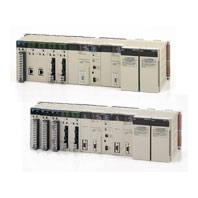
Redundant CPU Units, Power Supply Units, Communications Units, and Expansion I/O Cables
- Features
- Lineup
- Specifications
- Dimensions
- Catalog
last update: April 1, 2020
Flexible configuration to suit your system requirements
Choose the level of redundancy needed
Supports a variety of network configurations
Redundant communications can be created via Ethernet and Controller Link which is widely used in FA applications.
A variety of networks are available at the I/O level, including open networks DeviceNet and CompoNet with a proven track record in the CS1 Series.
Easy installation and operation of reliable systems
Easy duplexing of CPU units
All programs and data in the active CPU unit are automatically transferred to the standby CPU unit to synchronize them between CPU units.
This eliminates the need to select synchronized data or transfer individually.
When an error occurs in the active CPU unit, the standby CPU unit takes over control immediately (within one cycle time).
The active and standby CPU units always operate synchronously. If an error occurs in the active CPU unit, the standby CPU unit continues control automatically and continuously.
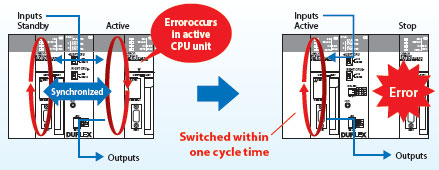
Easy duplexing of communications units
The CPU unit automatically selects the normally functioning communications unit.
There is no need for complex programming to switch when an error occurs or special data link area for duplexing.
Easy duplexing of power supply units
A duplex power supply system can be configured with two power supply units connected to a CPU rack, expansion rack, or long-distance expansion rack, which prevents the system from going down due to a power supply unit error.
A power supply unit that malfunctions can be identified by flags in the AR Area of the CPU unit.
Replace units during power supply
The CPU unit, power supply unit, duplex unit, basic I/O unit, and special I/O unit can be replaced during power supply or operation. In addition, cable disconnections are monitored, so failures can be located easily.
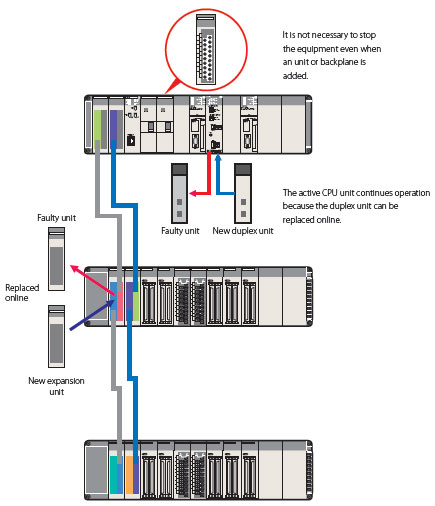
Remove or add units without using a programming device
The duplex CPU, dual I/O expansion system does not require special software or an HMI to replace units online.
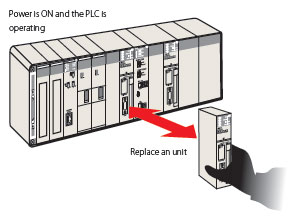
Automatic recovery to duplex operation
After the standby CPU unit becomes active due to accidental errors caused by noise or other factors, the stopped CPU unit can be restarted without the need for manipulation by operators and automatically returned to duplex operation.
The period during which only a single CPU unit operates is shortened, maintaining duplex operation to prepare for errors.
(Setting in PLC Setup is required. When hardware breaks down, the CPU unit is not returned to duplex operation after restart. The unit needs to be replaced.)
Improve development productivity
CPU unit with a large program capacity of 400K steps for structured and modular programming
Omron offers 10 models of CPU units to suit a variety of purposes and applications, from small- to large-scale systems. By combining I/O units and special units with any CPU unit, you can configure a lean and efficient system.
The CS1D-CPU68HA has a user memory capacity of 400K steps and 25 Extended Data Memory banks. The total memory capacity is 5 MB including user program, data memory, and comment memory. It has sufficient capacity to provide flexibility in structured and modular programming and to be used for larger systems.
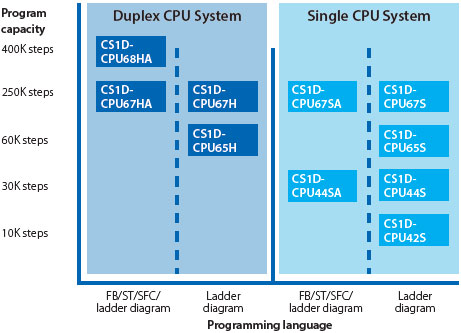
Improve development productivity by reusing and sharing programs
The CPU unit supports the IEC 61131-3 programming languages: ladder diagram, ST, and SFC. FBs allow you to reuse and share programs, which will improve programming efficiency.
The programs in these languages and using FBs have a higher visibility than conventional ladder programs, making modification and maintenance quicker and easier. FBs, ST, and SFC can be used with the CS1D-CPU[][]HA Duplex CPU System CPU Unit and CS1D-CPU[][]SA Single CPU System CPU Unit.
(ST: Structured Text, FB: Function Block, SFC: Sequential Function Chart)
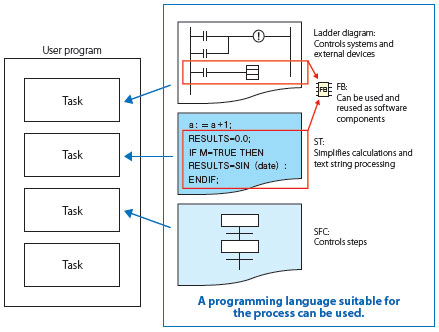
Reuse software assets
The CX-One software can be used even when the CS Series is used together with the CJ Series. Programs and data are compatible with each other, making reuse easier. The specifications of FB and ST supported by the CS1D-CPU[][]HA and CS1D-CPU[][]SA are compatible with those supported by the CS1H/G and CJ2 Series.
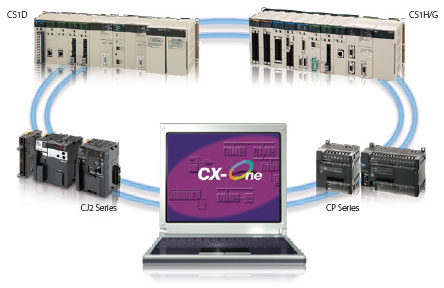
Units common to all CS Series
The same I/O units and special units can be used in both the CS1D Duplex System and CS1H/G. This enables parts required for repair and maintenance to be shared between systems, reducing the number of spare parts.
Verify errors on physical devices
The error check (FAL and FALS) instructions can be used to simulate errors. You can verify the behavior of the HMI and other devices for each error state of the duplex CPU units.
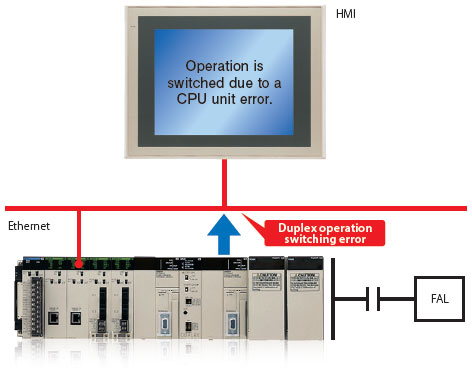
last update: April 1, 2020
